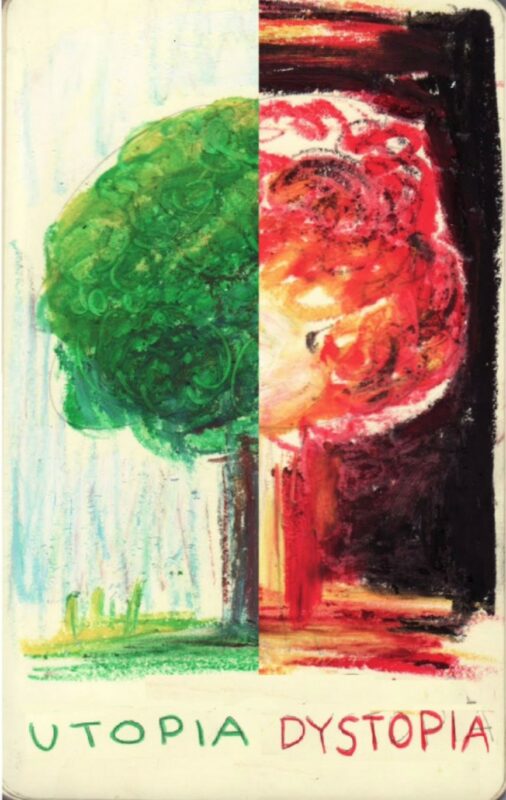The 2023 Society for U.S. Intellectual History annual conference will be held in Denver, Colorado, November 9-11. The site for the conference is the Curtis Hotel right in the heart of downtown. The conference theme is “Utopia/Dystopia: Intellectual Landscapes of Dreams and Disasters.”

Art by Dylan Glenn
The inspiration for this theme might seem obvious, climate change causing increasingly more devastating environmental disasters and the long-term concentration of wealth creating social and political disparities with dire consequences. Yet the conference is also inspired by the work of the late Mike Davis, author of several books that powerfully capture the utopia-dystopia dialectic. “This seems an age of catastrophe,” Davis wrote in City of Quartz, “but it’s also an age equipped, in an abstract sense, with all the tools it needs. Utopia is available to us. If, like me, you lived through the civil-rights movement, the antiwar movement, you can never discard hope.” We are pleased to announce that Davis and his impressive body of provocative scholarship will be the subject of a conference plenary session.
We are also happy to announce that Kathleen Belew, Associate Professor of History at Northwestern University, will be our keynote speaker. She is the author of Bring the War Home: The White Power Movement and Paramilitary America (Harvard, 2018, paperback 2019). In it, she explores how white power activists created a social movement through a common story about betrayal by the government, war, and its weapons, uniforms, and technologies. By uniting Ku Klux Klan, neo-Nazi, skinhead, and other groups, the movement mobilized and carried out escalating acts of violence that reached a crescendo in the 1995 bombing of Oklahoma City. This movement was never adequately confronted, and remains a threat to American democracy. Belew’s next book project, Home at the End of the World (Random House), which will be the subject of her keynote lecture, illuminates our era of apocalypse through a history focused on her native Colorado. It was in Colorado in the 1990s where high-profile kidnappings and murders, right-wing religious ideology, and a mass shooting exposed rents in America’s social fabric, and dramatically changed our relationship with place, violence, and politics.
We invite submissions that respond to the conference theme or that deal with any other aspect of U.S. intellectual history or the teaching of U.S. intellectual history.
Please direct any questions about the conference to Andrew Hartman at [email protected].
Types of Submissions
Traditional Panels (4-6 people):
A traditional panel will include a chairperson and either three or four presenters. The panel chairperson may also serve as a commentator, or the panel may include a separate commentator.
Traditional Panel submissions must include the following materials: a title for the panel; a designated chair; names, email addresses, and institutional affiliations (if any) of all panel participants; a 200-word abstract for each paper; a separate 300-word abstract for the entire panel; a one-page CV for each participant.
Roundtables (4-6 people):
A roundtable will include four or five discussants. One of the discussants may serve as the roundtable chair/moderator, or the roundtable may include a separate chair/moderator.
Roundtable submissions must include the following materials: a title for the roundtable; names, email addresses, and institutional affiliations (if any) of all roundtable participants; a 200-word description of each discussant’s expected contribution to or intervention in the discussion; a separate 300-word abstract for the entire roundtable; a one-page CV for each participant.
Author Meets Critics (3-6 people):
Such a session will be about a recent book in U.S. intellectual history where one or more scholars will present their analysis of the book, followed by a response by the author themself. One of the presenters may also serve as the chair, or the chair may be a separate person.
Author Meets Critics submissions must include the following materials: the title of the book and a 200-word synopsis/abstract of the book; names, email addresses, and institutional affiliations (if any) of all participants; a 200-word description of each discussant’s expected intervention; a one-page CV for each participant.
Single Paper Proposal:
Although preference will be given to organized panels, we are accepting individual paper submissions.
All individual paper submissions must include the following materials: a title for the paper; name, email addresses, and institutional affiliations (if any); a 200-word abstract for the paper; a one-page CV. Submissions should also include (1) a hierarchical list of themes, topics, events, and other relevant keywords (related to intellectual history, as much as possible); and (2) the paper’s anticipated chronology. These tools will aid in the creation of sessions.
Submission Guidelines
- The committee is especially eager to ensure a diverse representation of scholars at the conference. We welcome submissions from graduate students, professional historians, academics working in adjacent fields, scholarly professionals working outside the academy, independent scholars, and high school teachers. We strongly encourage panels that reflect the diversity of our field in terms of gender, ethnicity, sexual orientation, and/or institutional prestige of panelists.
- Individuals may appear on the program no more than twice. Those appearing twice must do so in two distinct capacities (paper presenter, panel commentator, roundtable discussant, etc.). Participants may, for example, deliver a paper and be a panel commentator, but may not present two papers.
- Our conference venue makes the rental of A/V equipment prohibitively expensive, so we ask that panels not rely on access to it.
- The committee will assume that submission to the conference is an indication that participants will be able to present at any time on November 10 or 11. If religious practice, teaching schedules, ADA requests, or other obligations limit when you can present, please note such limitations with the proposal.
- All persons appearing on the program will be required to register for the conference and to become members of S-USIH.
- All documents should be submitted to the email address [email protected] in a single PDF document. The deadline for submissions is April 15, 2023, and notifications will be sent to session organizers by June 15, 2023.

0